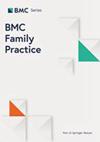基层医疗团队为慢性病患者提供的自我管理教育和支持计划的特点:快速审查
IF 3.2
3区 医学
Q1 MEDICINE, GENERAL & INTERNAL
引用次数: 0
摘要
在为慢性病患者制定和推广自我管理教育和支持(SMES)计划方面,初级医疗机构可以发挥重要作用。我们从以下几个方面回顾了有关基层医疗机构自我管理教育和支持项目的研究:基层医疗机构自我管理教育和支持项目的模式、自我管理教育和支持团队的组成以及参与者的特征。在这一混合方法的快速综述中,我们检索了PubMed和Cochrane图书馆数据库,以确定在2013年1月1日至2021年12月31日期间发表的、评估基层医疗机构针对四种主要慢性疾病(糖尿病、癌症、心血管疾病和/或呼吸系统慢性疾病)的SMES项目的英文和法文文章。我们排除了非原创性研究和综述文章。我们使用混合方法评估工具对所选研究的质量进行了评估。我们按照 PRISMA 指南报告了研究结果。我们在分析中纳入了 68 项研究。在 46/68 项研究中,SMES 模型主要侧重于组织层面(n = 24)。慢性病护理模式是使用最多的组织模式(9 项)。只有三项研究描述了多维模式。一般来说,SMES 团队由两名医疗服务提供者(主要是护士)组成,很少有与社区参与者合作的报道。参与者主要是只患有一种慢性疾病的患者。只有 20% 的所述计划考虑到了多病症问题。我们的快速审查主要集中在两个数据库中,并没有确定 SMES 计划的成果。我们的研究结果突出表明,尽管有人建议在 SMES 计划中采用更多跨学科方法,但社区参与者的影响有限,而且 SMES 计划很少考虑多病共存问题。本次快速审查确定了初级保健中SMES计划发展的改进领域,特别是护士在其推广过程中的特殊地位。prospero 2021 crd42021268290 .本文章由计算机程序翻译,如有差异,请以英文原文为准。
Characteristics of self-management education and support programmes for people with chronic diseases delivered by primary care teams: a rapid review
Primary care actors can play a major role in developing and promoting access to Self-Management Education and Support (SMES) programmes for people with chronic disease. We reviewed studies on SMES programmes in primary care by focusing on the following dimensions: models of SMES programmes in primary care, SMES team’s composition, and participants’ characteristics. For this mixed-methods rapid review, we searched the PubMed and Cochrane Library databases to identify articles in English and French that assessed a SMES programme in primary care for four main chronic diseases (diabetes, cancer, cardiovascular disease and/or respiratory chronic disease) and published between 1 January 2013 and 31 December 2021. We excluded articles on non-original research and reviews. We evaluated the quality of the selected studies using the Mixed Methods Appraisal Tool. We reported the study results following the PRISMA guidelines. We included 68 studies in the analysis. In 46/68 studies, a SMES model was described by focusing mainly on the organisational dimension (n = 24). The Chronic Care Model was the most used organisational model (n = 9). Only three studies described a multi-dimension model. In general, the SMES team was composed of two healthcare providers (mainly nurses), and partnerships with community actors were rarely reported. Participants were mainly patients with only one chronic disease. Only 20% of the described programmes took into account multimorbidity. Our rapid review focused on two databases and did not identify the SMES programme outcomes. Our findings highlight the limited implication of community actors and the infrequent inclusion of multimorbidity in the SMES programmes, despite the recommendations to develop a more interdisciplinary approach in SMES programmes. This rapid review identified areas of improvement for SMES programme development in primary care, especially the privileged place of nurses in their promotion. PROSPERO 2021 CRD42021268290 .
求助全文
通过发布文献求助,成功后即可免费获取论文全文。
去求助
来源期刊

BMC Family Practice
医学-医学:内科
CiteScore
3.20
自引率
0.00%
发文量
0
审稿时长
4-8 weeks
期刊介绍:
BMC Family Practice is an open access, peer-reviewed journal that considers articles on all aspects of primary health care research. The journal has a special focus on clinical decision making and management, continuing professional education, service utilization, needs and demand, and the organization and delivery of primary care and care in the community.
 求助内容:
求助内容: 应助结果提醒方式:
应助结果提醒方式:


